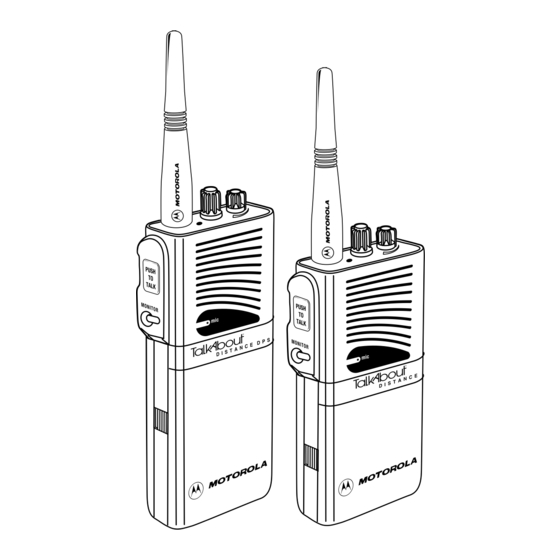Motorola DISTANCE Посібник користувача - Сторінка 6
Переглянути онлайн або завантажити pdf Посібник користувача для Двостороннє радіо Motorola DISTANCE. Motorola DISTANCE 10 сторінок. Motorola owner's manual talkabout distance dps

Before You Can Talk
Read this manual carefully, make sure you
know how to properly operate the radio
before use.
TalkAbout Distance radios have 10 channels
and 38 Interference Eliminator Codes. To talk
to others, all radios in your group must be set
to the same channel and code (see charts on
back cover).
Interference Eliminator Codes
Codes filter out static, noise and unwanted
chatter on radio channels. When you operate
on a channel with a code set, you block out
most interference on that channel. This allows
you to communicate with less interference
than when operating without a code. Remem-
ber, since radio channels can be monitored,
codes will not make your conversations private.
• For compatibility with radios that do not
have codes, the radio can be set to Code
"Off" in the programming mode.
IMPORTANT
To talk to others in your group all radios
must be set to the same channel and code.
Bandwidth
In the USA, the FCC has declared that all
Family Radio Service frequencies must oper-
ate on 12.5 kHz bandwidth. Your Talkabout
Distance radio ships pre-set on 25.0 kHz, but
can be set to 12.5 kHz while in the program-
ming mode. Handicom/Sport 10X radios
operate on 25.0 kHz as well. All other Talk-
about and Sport 7/7X radios operate on 12.5
kHz bandwidth. For optimal audio quality, all
radios in your talk group should be set to the
same band.
8
Compatibility
Channels 1-7 on your TalkAbout Distance are
compatible with TalkAbout/TalkAbout Plus,
Sport 7/7X and 10X radios. Channels A and B
are compatible with SportBASE and Sport
10X radios. The emergency channel (C) is to
be used only for the purpose of soliciting or
rendering assistance to a traveller, or for
communicating in an emergency pertaining
to the immediate safety of life or the immedi-
ate protection of property. The emergency
channel is used by certain organizations dur-
ing emergency situations and is not neces-
sarily monitored. See back cover for chart of
channels and codes.
To C ange Code and
Bandwidth Settings
1. Hold Push-To-Talk button down while
turning radio on. Fig. J
Radio announces current code setting.
Example: "code one"
2. Press Push-To-Talk to scroll through
codes. Fig. K
Radio announces each code as you
scroll. Example: "two...three...four"
3. Release Push-To-Talk when you have
reached desired code.
4. Press Monitor button to select and save
new code setting. Fig. L
Radio "beeps" , then announces
current band setting.
Example: "band two five point zero"
5. Press Push-To -Talk to toggle between
bands. Fig. K
Radio announces each band as you
toggle. Example: "one two point five"
6. Press Monitor button to select and save
new band setting. Fig. L
Radio "beeps" to indicate it has
exited programming and is ready
for use.
Push-To-Talk
FIG. J
Notes:
• Code numbers with two digits (10-38) will
be announced "one zero...three eight".
• You can only scroll forward when select-
ing a code.
• When you are changing your code or
band, you can not send messages.
• The code and band settings apply to all
channels. You can not select a different
code or band for each channel.
Monitor
FIG. K
FIG. L
9
